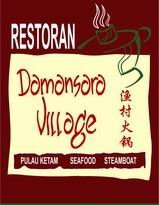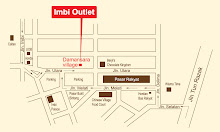
Teoh shows off an aquarium in his Kuala Lumpur restaurant
(The following article from the
New Straits Times online)
Patrick Teoh, the former voice of Malaysian radio, talks to DENNIS CHUA about his latest roles as restaurateur and chicken farme.
WHILE Patrick Teoh is best known as a veteran radio personality, television presenter, actor and voiceover talent, he has now added literally, another feather to his cap.
Ipoh-born Teoh runs a chicken farm in Sungkai near Bidor, Perak, which supplies meat for his Damansara Village Restaurants in Kuala Lumpur and Petaling Jaya.
Damansara Village Petaling Jaya is located in Kampung Sungai Kayu Ara, directly opposite the Shell petrol station in SS23 while Damansara Village Kuala Lumpur is in Jalan Utara, off Jalan Imbi, near Pasar Rakyat.
The Petaling Jaya restaurant, which specialises in steamboat, opened its doors in August 2006 while the KL restaurant opened during Chinese New Year this year.
Teoh, who runs the restaurants with his daughter Melanie, her husband Jason Yap and a family friend Alan Phoon, says he decided to “try something different”, after running three bars between 1980 and 2000.
“I ran The Bistro in Bandaran Berjaya, Kota Kinabalu, in the 1980s for three years, followed by Alibi in Central Market Kuala Lumpur, also for three years, in the late 1990s,” he says.
“Then, from 1998 to 2000, I had Radio City in 1Utama, PJ, which had guest DJs on weekends.” Teoh said running bars invited “visits” by the authorities, so it was much better to have a restaurant or two.
“The four of us settled on a Chinese restaurant with a village theme serving steamboat, a small town favourite which does not require the expertise of cooks,” he says.
They made their first restaurant in Petaling Jaya “more than just an eatery” by setting up a mini zoo within its compound.
They had rabbits, turkeys, bantam chickens, iguanas and tortoises as well as a man-made pond stocked with little fish for youngsters to net.
“The pond brings back memories of ‘longkang’ fishing, a common pastime in small towns during my childhood,” he says.
Teoh replicated the mini zoo, minus the turkeys, in his Kuala Lumpur restaurant. In addition, he decorated both restaurants with little teapots made in Malaysia, China and Indonesia.
“The teapots give the restaurants the feel of a village teahouse,” he says. The walls are decorated with newspaper and magazine articles about them and himself.
Teoh and his partners created their very own soup stock for their steamboat.
“We experimented for two months and found the right taste in time for the opening of the first restaurant.” The PJ restaurant is twice the size of the KL restaurant which is 900 sq m.
“The KL restaurant, which occupies a bungalow built in 1936, has an air-conditioned dining room and also serves lunch.
“Chicken meals are only served in KL, with meat fresh from our farm,” he says.
Teoh says the farm was Phoon’s idea.
“Alan had a chicken meal during a visit to Guangzhou in China. He enjoyed it, and the restaurant owner subsequently told him he bred his chickens in an organic farm.
“Back home, he convinced me that we should have one, so we leased a plot from a farmer in Sungkai,” he says.
Teoh and Phoon have more than 100 chickens and 60 ducks on the farm. The ducks are of the Muscovy variety, best known for their hissing calls and warty, red faces.
“The ducks, also called Manila ducks, are for our weekend menus. We serve steamed, not roasted duck, and the Muscovy is excellent for this,” he says.
The chickens and ducks on Teoh’s farm are organic, meaning they are fed with vegetables and oats and are free-range birds.
“We rear them for 100 days. They roam freely for 75-80 days, and for the next 20 days, they are kept in cages. Free-range birds have gamier meat,” he says.
Teoh also gets haruan fish for his restaurants from a nearby Senoi Orang Asli village.
“Haruan is popular because it is believed to have healing properties. It’s caught from rivers in Sungkai, while our chickens are served the same day they are slaughtered,” he says.
The KL restaurant serves only steamed chicken, a “healthier choice” for diners but it also has bamboo clams, “drunken pot” herbal soup, baked crabs, steamed clams, paper-wrapped chicken, cold crabs and mantis prawns.
Teoh’s interest in the business was fuelled by restaurant reviews he did during his days as a radio presenter.
“I used to pay incognito visits to restaurants around the Klang Valley in the 1990s. The reviews lasted a year, and I spoke my mind on whether the restaurants were good or otherwise,” he says.
He has no plans to feature his restaurants and farm in future film projects.
However, he may do so if given the opportunity, since his experience in running bars came in handy when he starred in the play, Wacky Bar, last year.
“In Wacky Bar, I played a man named Wacky Wong, who owned a popular bar. The characters who played my customers resembled people I encountered during my bar-owner days,” he says.
“I’m happy to have found good locations for my restaurants. They may appear tucked away from the major roads but are actually very accessible,” he says.

Teoh is not chicken-hearted when it comes to rearing hens for his restaurants

Damansara Village@Damansara Jaya1067, Jalan Jenjarum, Kg. Sg. Kayu Ara, off Jalan SS23/10, 47400 Petaling Jaya.Tel: 03 7803 1832 GPS coordinates: Latitude: 3° 7'26.64"N Longitude: 101°36'46.71"E
&
Damansara Village@Imbi
32, Jalan Utara off Jalan Imbi
(opposite Pasar Rakyat) 55100 Kuala Lumpur.
Tel: 2141-1678
GPS coordinates Latitude: 3°08'40.91"N Longitude 101°43'01.70"E





 And much more
And much more






